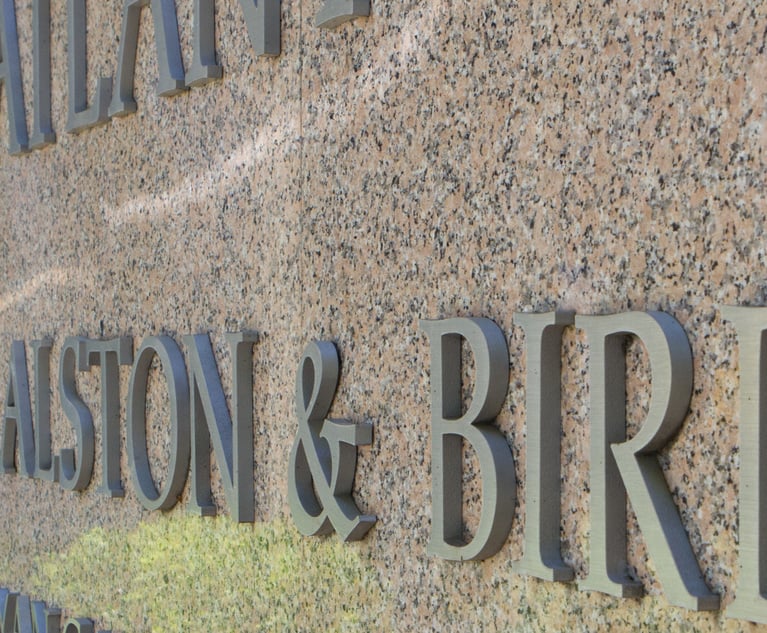 Michael Riesen, Smith Gambrell & Russell, Atlanta. (Courtesy photo)
Michael Riesen, Smith Gambrell & Russell, Atlanta. (Courtesy photo)Smith Gambrell Launches AI Lab to Advance IP Legal Operations
“We want to make sure the GCs of the world have the information at their fingertips," said Mike Riesen, executive director of the new lab.
April 15, 2019 at 02:48 PM
5 minute read
Smith Gambrell & Russell has recruited patent lawyers Mike Riesen and Indhira LaPuma to start an artificial intelligence lab for the firm, with the initial aim of making patent prosecution and IP portfolio management more cost-effective and efficient.
 Indhira A. LaPuma, Smith, Gambrell & Russell. (Courtesy photo)
Indhira A. LaPuma, Smith, Gambrell & Russell. (Courtesy photo)Riesen, who joined as a partner from BakerHostetler, is the executive director of SGR Labs, which launched this month. LaPuma, who joined Smith Gambrell this week as counsel, was innovation counsel for one of Riesen's clients, VF Corp., the holding company for retail brands such as North Face, Timberland, Wrangler and Vans.
The two Atlanta-based lawyers were planning to start their own company, Riesen said, providing both legal services and counsel on updating legal operations to help in-house law departments better interface with the business side. Both have backgrounds in computer engineering.
He told Greg Kirsch, who heads Smith Gambrell's IP department, about their plan over coffee—then pitched it to the firm's executive committee.
“They were willing to take on our unconventional scenario,” said Riesen, who'd worked as Kirsch's associate almost a decade ago at Ballard Spahr. “We will take on things that don't look like the billable hour while still continuing to practice law with our clients.”
Kirsch said Smith Gambrell has a full-service IP practice with about 30 lawyers, of whom half are IP litigators and half are patent lawyers. “I think Mike and Indhira are going to be a critical part of our further expansion,” he said.
“We've got the full breadth of engineering, electrical, mechanical, biotech and medical devices,” Kirsch said, as far as patent prosecution expertise. “They really add to that.”
|What It Does
There are three areas where the new SGR Labs can help both the firm and clients, said Riesen: data analytics, software implementation and automation.
Data analytics is a way to “help the communication between the legal department and the business units for a client,” Riesen said, by allowing nonlawyers to quickly visualize the data that's already there, such as a company's patent holdings.
“We want to make sure the GCs of the world have the information at their fingertips. They are constantly bombarded with questions from the business unit,” he said. “For example, a GC calls me up and says, 'Mike I'm going into a meeting [with the business side]. What patents do we have that cover this product?”
With proper legal operations, Riesen said, a company's legal team already has that understanding and can customize the data visualization for lawyers or non-lawyers. “The GC can give [nonlawyers] a version they can work with and make decisions on.”
“Delivering legal services has to be practical,” he said. “The business people want to make a decision in 15 minutes.”
A business unit could be looking at a new product that it wants to rush to market, Riesen said, but its legal department may say it needs a patent, which could take two years to procure. “The business people want to know why they need a patent. They want to move fast.”
“The legal department needs to demonstrate the connection between the IP portfolio and the bottom line,” he said. “They have the data—the [company's] investment in patents versus the cost of IP litigation, settlement or licensing. It's there, but they need to extract it in a way that's useful for the business side.”
The longer-term goal for the lab, Riesen said, is to be able to measure the time and cost of procuring a patent versus the risks and costs of infringement.
“Indhira is very helpful in keeping me grounded,” Riesen said, noting LaPuma's experience in-house at VF Corp. and Caterpillar. “She has navigated the questions between in-house lawyers, the business guys and inventors.”
Software implementation, one of the lab's other priorities, means making sure a legal team has the right tool for the right job. “We've audited a lot of softwares,” Riesen said, adding that, if the right contract management solution, for instance, isn't available, then they can build it. He and LaPuma are working with a pool of contract software developers, who are also patent attorneys.
|Robot Lawyers?
Using automation to reduce expensive lawyer time spent on legal work is the third area Riesen and LaPuma are focused on.
“People like to throw around the term 'bill smarter time.' We're here to help that,” said Riesen, who has a master's degree in AI and machine learning.
For a patent application, a subject-matter expert must first work with an inventor and write up the patent claims, Riesen said, which can't be outsourced to a computer. But once that is done, it can take another 20 to 30 hours to write the full patent application. He said AI software with machine learning capabilities can assist in drafting portions of it.
There is a lot of hype in this area, he cautioned. “Right now, there are a lot of people out there pitching software that they say can give you the final product and you can go file it. I've never seen a single product out there that meets my or my clients' expectations for something ready to be filed with the government,” he said. “You need quality control.”
SGR Labs is working with both Smith Gambrell lawyers and client legal departments. Services can be billed either hourly or on a flat fee, Riesen said, adding that flat fee services include patent portfolio assessment and management (which could be a monthly fee).
This content has been archived. It is available through our partners, LexisNexis® and Bloomberg Law.
To view this content, please continue to their sites.
Not a Lexis Subscriber?
Subscribe Now
Not a Bloomberg Law Subscriber?
Subscribe Now
NOT FOR REPRINT
© 2025 ALM Global, LLC, All Rights Reserved. Request academic re-use from www.copyright.com. All other uses, submit a request to [email protected]. For more information visit Asset & Logo Licensing.
You Might Like
View All
On the Move: Freeman Mathis & Gary Promotes 16 to Partner, Expands to Denver
5 minute read

Georgia Supreme Court Honoring Troutman Pepper Partner, Former Chief Justice
2 minute read
Trending Stories
- 1You Too Can Be a Programmer: Connecting to Legal Platform APIs With Generative AI (Part 2)
- 2Court of Appeals and Appellate Division As Courts of First Instance
- 3Federal Judge Slaps Down the SEC’s Attempt to Regulate Crypto Liquidity Providers
- 4A Client Is Guilty; But Another Man Is Wrongfully Convicted
- 5Legal Tech's Predictions for Cybersecurity in 2025
Who Got The Work
Michael G. Bongiorno, Andrew Scott Dulberg and Elizabeth E. Driscoll from Wilmer Cutler Pickering Hale and Dorr have stepped in to represent Symbotic Inc., an A.I.-enabled technology platform that focuses on increasing supply chain efficiency, and other defendants in a pending shareholder derivative lawsuit. The case, filed Oct. 2 in Massachusetts District Court by the Brown Law Firm on behalf of Stephen Austen, accuses certain officers and directors of misleading investors in regard to Symbotic's potential for margin growth by failing to disclose that the company was not equipped to timely deploy its systems or manage expenses through project delays. The case, assigned to U.S. District Judge Nathaniel M. Gorton, is 1:24-cv-12522, Austen v. Cohen et al.
Who Got The Work
Edmund Polubinski and Marie Killmond of Davis Polk & Wardwell have entered appearances for data platform software development company MongoDB and other defendants in a pending shareholder derivative lawsuit. The action, filed Oct. 7 in New York Southern District Court by the Brown Law Firm, accuses the company's directors and/or officers of falsely expressing confidence in the company’s restructuring of its sales incentive plan and downplaying the severity of decreases in its upfront commitments. The case is 1:24-cv-07594, Roy v. Ittycheria et al.
Who Got The Work
Amy O. Bruchs and Kurt F. Ellison of Michael Best & Friedrich have entered appearances for Epic Systems Corp. in a pending employment discrimination lawsuit. The suit was filed Sept. 7 in Wisconsin Western District Court by Levine Eisberner LLC and Siri & Glimstad on behalf of a project manager who claims that he was wrongfully terminated after applying for a religious exemption to the defendant's COVID-19 vaccine mandate. The case, assigned to U.S. Magistrate Judge Anita Marie Boor, is 3:24-cv-00630, Secker, Nathan v. Epic Systems Corporation.
Who Got The Work
David X. Sullivan, Thomas J. Finn and Gregory A. Hall from McCarter & English have entered appearances for Sunrun Installation Services in a pending civil rights lawsuit. The complaint was filed Sept. 4 in Connecticut District Court by attorney Robert M. Berke on behalf of former employee George Edward Steins, who was arrested and charged with employing an unregistered home improvement salesperson. The complaint alleges that had Sunrun informed the Connecticut Department of Consumer Protection that the plaintiff's employment had ended in 2017 and that he no longer held Sunrun's home improvement contractor license, he would not have been hit with charges, which were dismissed in May 2024. The case, assigned to U.S. District Judge Jeffrey A. Meyer, is 3:24-cv-01423, Steins v. Sunrun, Inc. et al.
Who Got The Work
Greenberg Traurig shareholder Joshua L. Raskin has entered an appearance for boohoo.com UK Ltd. in a pending patent infringement lawsuit. The suit, filed Sept. 3 in Texas Eastern District Court by Rozier Hardt McDonough on behalf of Alto Dynamics, asserts five patents related to an online shopping platform. The case, assigned to U.S. District Judge Rodney Gilstrap, is 2:24-cv-00719, Alto Dynamics, LLC v. boohoo.com UK Limited.
Featured Firms
Law Offices of Gary Martin Hays & Associates, P.C.
(470) 294-1674
Law Offices of Mark E. Salomone
(857) 444-6468
Smith & Hassler
(713) 739-1250






